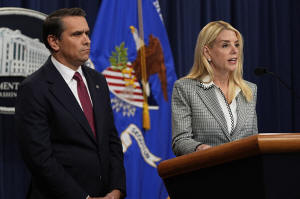Kilmar Abrego Garcia returned to the US, charged with transporting
people in the country illegally
[June 07, 2025]
By ERIC TUCKER, ALANNA DURKIN RICHER, LINDSAY WHITEHURST
and BEN FINLEY
WASHINGTON (AP) — Kilmar Abrego Garcia, whose mistaken deportation to El
Salvador became a political flashpoint in the Trump administration's
stepped-up immigration enforcement, was returned to the United States on
Friday to face criminal charges related to what the Trump administration
said was a large human smuggling operation that brought immigrants into
the country illegally.
His abrupt release from El Salvador closes one chapter and opens another
in a saga that yielded a remarkable, months-long standoff between Trump
officials and the courts over a deportation that officials initially
acknowledged was done in error but then continued to stand behind in
apparent defiance of orders by judges to facilitate his return to the
U.S.
The development occurred after U.S. officials presented El Salvador
President Nayib Bukele with an arrest warrant for federal charges in
Tennessee accusing Abrego Garcia of playing a key role in smuggling
immigrants into the country for money. He is expected to be prosecuted
in the U.S. and, if convicted, will be returned to his home country of
El Salvador at the conclusion of the case, officials said Friday.
“This is what American justice looks like,” Attorney General Pam Bondi
said in announcing Abrego Garcia's return and the unsealing of a grand
jury indictment.
Abrego Garcia's attorneys called the case “baseless."
“There’s no way a jury is going to see the evidence and agree that this
sheet metal worker is the leader of an international MS-13 smuggling
conspiracy,” attorney Simon Sandoval-Moshenberg said.

Federal Magistrate Judge Barbara Holmes in Nashville, Tennessee,
determined that Abrego Garcia will be held in custody until at least
next Friday, when there will be an arraignment and detention hearing.
Abrego Garcia appeared in court wearing a short-sleeved, white,
button-down shirt. When asked if he understood the charges, he told the
judge: “Sí. Lo entiendo.” An interpreter then said: “Yes. I understand.”
Democrats and immigrant rights group had pressed for Abrego Garcia’s
release, with several lawmakers — including Sen. Chris Van Hollen of
Maryland, where Abrego Garcia had lived for years — even traveling to El
Salvador to visit him. A federal judge had ordered him to be returned in
April and the Supreme Court rejected an emergency appeal by directing
the government to work to bring him back.
But the news that Abrego Garcia, who had an immigration court order
preventing his deportation to his native country over fears he would
face persecution from local gangs, was being brought back for the
purpose of prosecution was greeted with dismay by his lawyers.
The case also prompted the resignation of a top supervisor in the U.S.
attorney’s office in Nashville, according to a person familiar with the
matter who spoke on the condition of anonymity to discuss a personnel
matter.
Ben Schrader, who was chief of the office’s criminal division, did not
explain the reason for his resignation but posted to social media around
the time the indictment was being handed down, saying: “It has been an
incredible privilege to serve as a prosecutor with the Department of
Justice, where the only job description I’ve ever known is to do the
right thing, in the right way, for the right reasons.”
He declined to comment when reached by The Associated Press on Friday.
Abrego Garcia's lawyer calls charges ‘preposterous’
“This administration ... instead of simply admitting their mistake,
they’ll stop at nothing at all, including some of the most preposterous
charges imaginable," Sandoval-Moshenberg said.
Ama Frimpong, legal director with the group CASA, said Abrego Garcia's
family has mixed emotions about his return to the U.S.
“Let him talk to his wife. Let him talk to his children. This family has
suffered enough,” she said.

Sandoval-Moshenberg said Abrego Garcia is one of the first, if not the
first, person released from a notorious prison in El Salvador, though he
was later imprisoned at another facility.
“So it’s going to be very interesting to hear what he has to say about
the way in which he was treated,” the attorney said.
The indictment, filed last month and unsealed Friday, lays out a string
of allegations that date back to 2016 but are only being disclosed now,
nearly three months after Abrego Garcia was mistakenly deported and
following the Trump administration’s repeated claims that he is a
criminal.
[to top of second column]
|

Attorney General Pam Bondi speaks as Deputy Attorney General Todd
Blanche listens during a news conference about Kilmar Abrego Garcia
at the Justice Department, Friday June 6, 2025, in Washington. (AP
Photo/Julia Demaree Nikhinson)

It accuses him of smuggling throughout the U.S. thousands of people
living in the country illegally, including children and members of the
violent MS-13 gang, from Central America and abusing women he was
transporting. A co-conspirator also alleged that he participated in the
killing of a gang member’s mother in El Salvador, prosecutors wrote in
papers urging the judge to keep him behind bars while he awaits trial.
The indictment does not charge him in connection with that allegation.
“Later, as part of his immigration proceedings in the United States, the
defendant claimed he could not return to El Salvador because he was in
fear of retribution from the 18th Street gang,” the detention memo
states.
“While partially true — the defendant, according to the information
received by the Government, was in fear of retaliation by the 18th
Street gang — the underlying reason for the retaliation was the
defendant’s own actions in participating in the murder of a rival 18th
Street gang member’s mother," prosecutors wrote.
The charges stem from a 2022 vehicle stop in which the Tennessee Highway
Patrol suspected him of human trafficking. A report released by the
Department of Homeland Security in April states that none of the people
in the vehicle had luggage, while they listed the same address as Abrego
Garcia.
Abrego Garcia was never charged with a crime, while the officers allowed
him to drive on with only a warning about an expired driver’s license,
according to the DHS report. The report said he was traveling from Texas
to Maryland, via Missouri, to bring in people to perform construction
work.
In response to the report’s release in April, Abrego Garcia’s wife said
in a statement that he sometimes transported groups of workers between
job sites, “so it’s entirely plausible he would have been pulled over
while driving with others in the vehicle. He was not charged with any
crime or cited for any wrongdoing.”
Immigrant rights advocates vs. the Trump administration
Abrego Garcia's background and personal life have been a source of
dispute and contested facts. Immigrant rights advocates have cast his
arrest as emblematic of an administration whose deportation policy is
haphazard and error-prone, while Trump officials have pointed to prior
interactions with police and described him as a gang member who fits the
mold they are determined to expel from the country.
Abrego Garcia lived in the U.S. for roughly 14 years, during which he
worked construction, got married and was raising three children with
disabilities, according to court records. Trump administration officials
said he was deported based on a 2019 accusation from Maryland police
that he was an MS-13 gang member. Abrego Garcia denied the allegation
and was never charged with a crime, his attorneys said.

A U.S. immigration judge subsequently shielded Abrego Garcia from
deportation to El Salvador because he likely faced persecution there by
local gangs. The Trump administration deported him there in March, later
describing the mistake as “an administrative error” but insisting he was
in MS-13.
Even if Abrego Garcia is convicted of the charges announced Friday, the
Trump administration would still have to return to a U.S. immigration
court if it wanted to deport him to El Salvador, Sandoval-Moshenberg
said. He also expects the case in Maryland to continue as the federal
judge there considers whether the administration obeyed her orders to
return him.
Abrego Garcia's return comes days after the Trump administration
complied with a court order to return a Guatemalan man deported to
Mexico despite his fears of being harmed there. The man, identified in
court papers as O.C.G, was the first person known to have been returned
to U.S. custody after deportation since the start of President Donald
Trump’s second term.
___
Associated Press reporter Travis Loller in Nashville, Tennessee,
contributed to this report.
All contents © copyright 2025 Associated Press. All rights reserved
 |